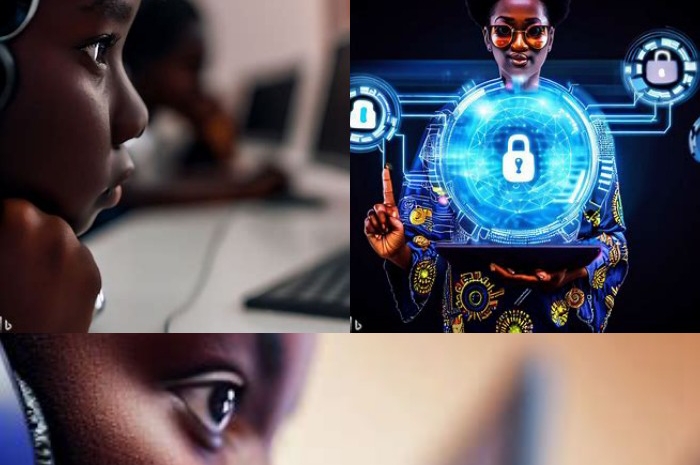The internet comes with both good and bad aspects for everyone. Empowering children with online safety has therefore become a necessity. Children are particularly vulnerable to negative online risks due to their naivety, as it exposes them to harmful and inappropriate content and danger from online criminals. It is therefore a necessity to empower children with online safety.
Role of Adults
Several measures can be taken to reduce the incidence of children falling prey to these risks. First, as children are minors, parents, guardians, and responsible adults need to supervise and guide them. Certainly, these adults must also be well-informed and educated about the risks and how to protect both themselves and children from online harm. To empower children with online safety, adults must possess the skills necessary for educating, communicating, and teaching their children about online risks and how to respond to threats. Their active participation is undoubtedly required through supervision, education, communication, monitoring, and the implementation of necessary controls.
The Environment matters to Empower Children with Online Safety
They should also actively monitor and use available tools to secure devices and accounts, in addition to practicing other safety measures. Furthermore, parents should ensure that learning platforms, classes, and sessions are safe, establish guidelines. It is essential that they create an environment that fosters responsible online behavior. Most importantly, the environment should be one that encourages children to report concerns when they access the internet, whether it’s at home, school, or other public places.
Education and Awareness
This is essential to empower children with online safety. Promoting awareness of the threats and consequences among children, parents, and teachers is fundamental. Indeed, we must now prioritize online safety and cybersecurity in children’s computer education and, indeed, in all forms of digital literacy from a very early age. It is important to invest in education and awareness through an approach that actively involves relevant stakeholders and communities (multistakeholder).
The fast pace of change in the digital space means we can’t afford to be complacent. In fact, cybersecurity is a moving target. We must stay informed and updated on current online trends and potential risks to better guide the online activities of children.
Technology and online communities
Technology providers, social media networks, and online communities should also implement effective child online safety measures for their platforms and facilities. Responsible and ethical online behavior should be the norm among online service providers, innovators, advertisers, and platform providers.
Legal
Empowering children with online safety also calls for enforcement of laws. Enforcing provisions of laws, such as cybersecurity and data protection laws that protect children online, especially those related to age-appropriate content and online privacy, is paramount. In this regard, security agencies, the legal system, and the technology industry all need to be involved in the detection, protection, enforcement aspects, and prosecution of online offenders.
Multi-stakeholder Compliance
In addition to implementing provisions for child online protection in existing laws and strengthening them, the government should also collaborate with stakeholders in security, technology, law/legal systems, education, as well as families, including children and parents. This collaboration is essential to monitor compliance with existing laws. It is critical to enact and enforce child online protection provisions in regulations and laws. It also ensures the effective implementation of these measures. Working together, these efforts can help close the gaps in existing legislation and create a safer online environment for children.
Non-Governmental Organizations (NGOs) in the cybersecurity sphere are also crucial for compliance, capacity building, and strategy development. Interestingly, I am one of the founders of the African Children Cyber Safety Initiative (ACCSI). It was established in 2009. This occurred during the Children and Young People Online Protection Forum organized by the African Information Security Association (AISA). ACCSI was created with a mandate to advance the cause of a safe online culture for children and young people in Africa.
Multistakeholder Funding and support
Ideas are valuable, but without resources and leadership commitment, they remain mere concepts. Stakeholders should actively fulfill their roles by providing funding and support for the implementation of safety measures, research and innovation, as well as training, awareness, and advocacy.
The Time is Now
In conclusion, empowering children with online safety is a vital responsibility. It should interest us all as digital skills undoubtedly become life skills.
By educating them about the potential risks, we equip our children with the tools they need. Fostering open communication and setting clear boundaries are key to helping them navigate and shape the digital world safely. Remember, they need online access for progress, it’s about guiding them to make informed and responsible choices. As parents, guardians, educators and interested groups, should show commitment to their digital well-being as an investment in their future and the future of the nation.
It is essential that they grow up to be knowledgeable and innovative. It is equally important that they become responsible and confident digital citizens. The march towards a safer online environment for our children is no trivial pursuit.
Author: Jide Awe
Science, Technology and Innovation policy advisor.
Find him on Twitter @jidaw
The Nigeria Data Protection Act, 2023
AISA tasks stakeholders on safe internet culture among children
